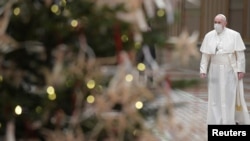Pope Francis has called on the world’s nations to share COVID-19 vaccines, saying that walls of nationalism must not be built in the face of a pandemic that knows no borders. He urged international cooperation so everyone can receive needed health care and vaccines.
In his Christmas message to the world, delivered indoors rather than, as customary, the balcony of Saint Peter's Basilica, Pope Francis said that in these times of darkness and uncertainty due to the pandemic, there are some lights of hope, like the discovery of vaccines against COVID-19.
But in order for these lights to shine and bring hope to the entire world, the pope added, they must be made available to all.
Pope Francis urged the world’s nations to ensure that vaccines are provided for everyone, especially for the most vulnerable, in all the regions on our planet.
“We cannot allow closed nationalisms to prevent us from living like the true human family that we are, the pope said, adding that “we cannot allow the virus of radical individualism to win and make us indifferent to the suffering of others.”
The pope focused much of his message Friday on the coronavirus pandemic before turning to the world’s hot spots and nations of concern. He urged the world to work together, irrespective of differences.
The pope said, “At this moment in history, marked by the ecological crisis and grave economic and social imbalances only worsened by the coronavirus pandemic, it is all the more important for us to acknowledge one another as brothers and sisters.”
Pope Francis spoke of the need to be generous, supportive and helpful, especially towards those who are vulnerable, the sick, those unemployed or experiencing hardship due to the economic effects of the pandemic, and women who have suffered domestic violence during these months of lockdown.
“In the face of a challenge that knows no borders,” the pope said, “we cannot erect walls. All of us are in the same boat.”
In his message, Pope Francis also turned his thoughts to the many children who all over the world, particularly in Syria, Iraq and Yemen, still pay the high price of war.






